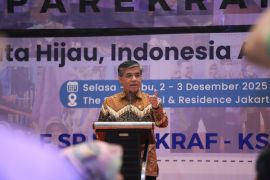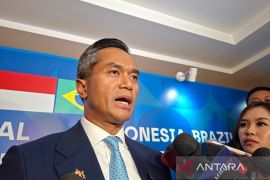So, the link-and-match system was 50 to 60 percent effective there."Jakarta (ANTARA News) - Indonesia is facing crucial manpower problems and need to improve the competitiveness of its human resources to enable them to compete in the labor market at home and in the ASEAN integrated region.
"Indonesia needs to find solutions and breakthroughs so that its manpower, as a national asset, will not become a burden for economic development," chairman of the Manpower Empowerment Affairs of the Indonesian Chamber of Commerce and Industry (Kadin) Frans Go said on Wednesday.
In addition to facing the threat of expatriate influx when the ASEAN Economic Community or the ASEAN free market integration comes into effect in 2015, Indonesia is also facing low workers quality, limited job opportunities and a high unemployment rate.
With rich natural resources, Indonesia should have been able to use its manpower to develop its natural resources for the prosperity of its people. In national development, there are two important elements apart from technology and innovation, namely natural wealth and human resources.
"Natural resources will be meaningless and will not be able to create prosperity for the people if they are not developed by competent and skilled manpower. Manpower has strategic position and plays an important role in development," Frans stated.
Thus, Indonesias manpower sector, according to Frans, basically faces problems at home and abroad. At home Indonesia faces three main problems, namely limited jobs, workers lack of quality and a high unemployment rate.
The countrys economic growth has not yet been able to absorb the workforce entering its job market.
According to the Kadins data, in 2013 each one percent of growth was only able to absorb 180,000 workers or only about 45 percent of the ideal projection. This also indicates that the quality of investment also tended to decline.
The quality of workers is also low. Data at the Central Bureau of Statistics (BPS) showed the composition of Indonesian workers; 52 million of them or 46.95 percent only had elementary school education.
The BPS data also showed that Indonesias unemployment rate was still high, with the rate rising to 6.25 percent in August 2013, from 5.92 percent in February 2013 and 6.14 percent in August 2012.
Therefore, according to the Kadin Chairman, Suryo Bambang Sulisto, the manpower issue is the most crucial problem that Indonesia is currently facing. Therefore, Indonesia should achieve a breakthrough to overcome it.
Surya stated that the problem became crucial because the population continued to increase, while the absorption capacity of employment tended to decline.
He pointed out that based on the Capital Investment Coordinating Board (BKPM) data, the realization of investment in the first quarter of 2014 amounted to Rp106.6 trillion but it was only able to provide jobs for 260,156 workers.
This decline was in comparison with that in the first quarter of 2013, when the investment only totaled Rp93 trillion yet was able to absorb 361,924 workers.
"This is an indication that investments had shifted from the labor-intensive to capital-intensive businesses. If this trend continues, the projection that is designed to absorb 400 thousand workers for each one percent of economic growth will not be achieved," Suryo Bambang Sulisto noted.
In addition, Indonesia will continue to face a serious unemployment issue if it does not change its policy of exporting natural resources, he remarked.
Therefore, according to Suryo, the Kadin recommended that the government should reinforce micro, small and medium-sized businesses, which so far were able to provide jobs for about 100 million workers and contributed 57 percent to the countrys gross domestic product.
Kadin also suggested that the quality of Indonesias workers overseas should be improved. "I think it is a noble mission for Indonesia to send skilled workers abroad. What is not noble, in my mind, is that if the state is not able to send workers overseas for a respectable placement," he asserted.
After all, the ASEAN Economic Community (AEC) will shortly be implemented wherein Indonesian manpower should be able to compete, both at home and abroad, with foreign workers.
During a rally to observe the International Labor Day or May Day on Thursday, Jaya Santoso, President of the Association of Indonesian Workers Unions (ASPEK), expressed concern about the planned implementation of the AEC.
He said the Indonesian workers will find it a challenge to face the ASEAN Economic Community in 2015, pointing out that the heads of state of the ASEAN countries as well as China, Japan, South Korea, Australia, New Zealand and India had agreed to the free movement of foreign workers in those countries.
"This should make us aware of the fact that foreign workers will pose a threat to us at home, as work opportunities can be tapped by them," he pointed out.
The National Profession Certification Agency (BNSP) expressed the need for Indonesia to increase the competence of its manpower in the face of the ASEAN Economic Community, which will be effective beginning in 2015.
"It should be done now. The new government must include it in the first 100 days of its working program," the BNSP deputy chairman, Sumarna F Abdurahman, said, referring to the government that will change in October after this years legislative and presidential elections.
He said the education system in Indonesia, which was not yet competence-based, posed a problem in the employment sector. Meanwhile, each industrial sector does not as yet have a manpower competence certification agency.
"In the ASEAN, school certificates are not used as a consideration for employment, but competence certificates are," he pointed out.
Indonesia has implemented profession certification programs. In its middle-term development plan (2009-2014), a total of 2.5 million people were certified but 80 percent of them were Indonesian migrant workers.
Meanwhile, the Indonesian Employers Association (Apindo) had also expressed the need for Indonesia to reform its educational system to improve the quality of its workers.
"There must be reforms in the educational system. Private companies must interfere and cooperate with the government," Apindos Committee Research member Bob Azam said.
He said about 52 percent of the workers in Indonesia were elementary school graduates. Their education concerned general subjects and had no relation with the industrial sector.
In Germany, he said, students of secondary schools had begun to be assisted by various companies. When they graduate they can directly work.
"So, the link-and-match system was 50 to 60 percent effective there. But in Indonesia where the link-and-match was launched, its effectiveness still needed to be increased," Bob said.
After all the productivity of Indonesian workers in the ASEAN region is still low if compared, for example, with that of Thailand and Malaysia. These two countries make large investments to improve the quality of their human resources, he added.
(T.A014/INE/KR-BSR/A014)
Reporter: Andi Abdussalam
Editor: Priyambodo RH
Copyright © ANTARA 2014












